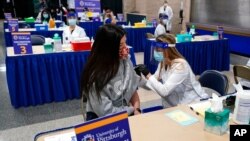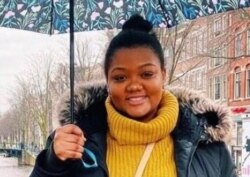Student Union
College Students Among Last on List for COVID Vaccines

College and university students are low on the list to receive COVID-19 vaccines, according to recent estimates.
Unless students are classified as essential workers — such as medical, nursing, medtech or student teachers — or have a health condition — such as human immunodeficiency virus or cancer — they are not likely to receive the COVID-19 vaccine until at least April, according to Dr. Anthony Fauci, director of the National Institute of Allergy and Infectious Diseases.
An assessment by the National Academies of Sciences, Engineering and Medicine (NASEM) of who should receive the vaccine and in what order placed younger people at a low priority compared with older recipients or people with health issues that make them more vulnerable to COVID-19 complications.
NASEM created the assessment at the direction of the U.S. Centers for Disease Control and Prevention (CDC) in Atlanta and the U.S. National Institutes of Health (NIH) in Maryland in October 2020. While the CDC recommends vaccination rollout procedures, states determine how to implement vaccine distribution.
Students say they are eager for campuses to reopen and classes to resume in person, and that inoculating students with the COVID-19 vaccine will hasten a return to education.
But distribution efforts have been disorganized, with delays, a lack of supply and appointment cancellations, compounded by varying policies in each state.
Imani Bell, a senior at the University of Delaware, is one of the few college students eligible for the vaccine through her teaching program. But despite trying to sign up for vaccinations in Delaware and her home state of New Jersey, she has had no luck scheduling an appointment; there are not enough doses of the vaccine available, she said.
“I hope that the rollout starts to pick up and that everyone has access,” said Bell. “It doesn’t make sense that we’ve been in this pandemic for a year and it’s still taking so long. It’s frustrating to me that there are [few] companies making the vaccine when it could go so much faster.”
Eduardo Castellet Nogués, a sophomore from Spain at American University in Washington, said he’s seen some European universities open without complete vaccination.
“They’re finding ways to do it,” Nogués said. “I think this is the safest way to start that. If the entire campus is immune, then there’s absolutely no risk of anyone getting COVID.”
Some campuses — like Rowan University in New Jersey, Worcester Polytechnic Institute in Massachusetts and Lasell University in Massachusetts — are serving as vaccination sites, according to Gerri Taylor, co-head of the COVID-19 task force at the American College Health Association (ACHA).
The vaccination sites are available only to prioritized groups, such as those older than 65. But they will serve college students when doses become available, Taylor said.
While it would “be ideal,” Taylor said, to have campus-based vaccinations, vaccinating students near campuses would suffice.
“And I would hope that schools will do a good deal of advertising about where those locations are, make them convenient for students and also give a lot of information about the vaccine,” she said.
Taylor argues that vaccinating students before they leave campus and travel home would be a huge help to stopping the spread of the coronavirus by college students who routinely go between school and home into the community.
“We all, students included, still have to pay strict attention to wearing masks, physically distancing, avoiding crowds and washing hands, all of those public health measures that we have had in place throughout still need to be put in place,” she said.
There have been nearly 400,000 coronavirus cases on more than 1,900 college and university campuses since the start of the pandemic more than a year ago, according to the most recent tracking data from the New York Times. At least 90 students have died of coronavirus-related complications.
Joshua Goodart, a 22-year-old student at University of New Haven in Connecticut, died from coronavirus on February 6, the Hartford Courant reported. While Goodart had asthma, he was not considered high-risk for COVID-19 complications.
But some college students say they’re wary of coronavirus vaccinations. A study conducted at Eastern Connecticut State University of 592 graduate and undergraduate students showed that about half of students surveyed said they would get the vaccine, and half would not or remained uncertain.
Institutions of higher education are debating whether to require students to be vaccinated before returning to school, raising legal questions.
“Many colleges and universities can and do require that students be vaccinated against certain diseases,” such as human papillomavirus (HPV) and meningococcal disease, said Suzanne Rode, a counsel at Crowell & Moring, a law firm in San Francisco.
“The COVID-19 vaccines differ in that they have been authorized by the Food and Drug Administration under an Emergency Use Authorization, making the vaccines available sooner than they normally would due to the current public health emergency,” she explained.
Other challenges for not getting the vaccine might include “valid medical, disability, and sincere religious reasons can serve as a basis for declining the vaccine,” said Rode.
International students will be eligible for the vaccine as other students in their priority group, former Surgeon General Jerome Adams confirmed in December. Specific vaccination guidelines for those living, working and studying in the U.S. can be found on the government websites of the states where they reside.
Some international students are deciding whether to receive the vaccine in the U.S. or in their home countries. Nogués plans to get his dose of the vaccine wherever it becomes available first.
“From what I know, it is very likely that I will get it in the U.S. before I get it in Spain because the rollout in Spain has been slower than a lot of European countries,” Nogués said.
Benjamin Ola. Akande, president of Champlain College in Vermont, says that college and university leaders have a duty to protect the health of international students on campus during this pandemic.
“Coming to the college in the U.S. today is a life and death decision, and we need to recognize that,” said Akande, who came to study in the U.S. from Nigeria in 1979. “It’s a very conscious decision and therefore, there’s a responsibility on leaders of academies to ensure the safety and health care of students.”
See all News Updates of the Day
- By VOA News
Competition grows for international students eyeing Yale

It’s tough to gain admission to Yale University, and it’s getting even tougher for international students as standout students from around the world set their sights on Yale.
The Yale Dale News, the campus newspaper, takes a look at the situation here.
- By VOA News
Student from Ethiopia says Whitman College culture made it easy to settle in

Ruth Chane, a computer science major from Ethiopia, writes about her experiences settling into student life at Whitman College in the U.S. state of Washington.
"The community at Whitman College made sure I felt welcomed even before I stepped foot on campus," she says.
- By VOA News
Claremont Colleges student gets a shock when she heads home to Shanghai

In The Student Life, the student newspaper for the Claremont Colleges, a consortium of five liberal art colleges and two graduate schools in Claremont, California, student Rochelle Lu writes about readjusting to her Shanghai home after spending a semester in the United States.
- By VOA News
Cedarville University aims to ease transition for international students

Cedarville University in the U.S. state of Ohio says it’s got more than 140 international students representing 44 countries.
Here, the school interviews Jonathan Sutton, director of international student services. He talks about his job and the opportunities for international students on campus.
- By VOA News
Morehouse College offers prospective students tips on applying and thriving

Morehouse College, a private, historically Black liberal arts college in the U.S. state of Georgia, offers a guide for international students interested in attending the school.
Among the tips to apply and thrive at Morehouse:
- Take advantage of the school’s orientation program
- Turn to the school’s Center for Academic Success for tutoring, support and more
- Immerse yourself in campus life via clubs and societies
- By Reuters
US reviews Columbia University contracts, grants over antisemitism allegations

The administration of President Donald Trump said on Monday it will review Columbia University's federal contracts and grants over allegations of antisemitism, which it says the educational institution has shown inaction in tackling.
Rights advocates note rising antisemitism, Islamophobia and anti-Arab bias since U.S. ally Israel's devastating military assault on Gaza began after Palestinian Hamas militants' deadly October 2023 attack.
The Justice Department said a month ago it formed a task force to fight antisemitism. The U.S. Departments of Health and Education and the General Services Administration jointly made the review announcement on Monday.
"The Federal Government's Task Force to Combat Anti-Semitism is considering Stop Work Orders for $51.4 million in contracts between Columbia University and the Federal Government," the joint statement said.
The agencies said no contracting actions had been taken yet.
"The task force will also conduct a comprehensive review of the more than $5 billion in federal grant commitments to Columbia University."
The agencies did not respond to requests for comment on whether there were similar reviews over allegations of Islamophobia and anti-Arab bias.
Columbia had no immediate comment. It previously said it made efforts to tackle antisemitism.
College protests
Trump has signed an executive order to combat antisemitism and pledged to deport non-citizen college students and others who took part in pro-Palestinian protests.
Columbia was at the center of college protests in which demonstrators demanded an end to U.S. support for Israel due to the humanitarian crisis caused by Israel's assault on Gaza. There were allegations of antisemitism and Islamophobia in protests and counter-protests.
During last summer's demonstrations around the country, classes were canceled, some university administrators resigned and student protesters were suspended and arrested.
While the intensity of protests has decreased in recent months, there were some demonstrations last week in New York after the expulsion of two students at Columbia University-affiliated Barnard College and after New York Governor Kathy Hochul ordered the removal of a Palestinian studies job listing at Hunter College.
A third student at Barnard College has since been expelled, this one related to the occupation of the Hamilton Hall building at Columbia last year.
Canada’s immigration overhaul signals global shift in student migration
From Europe to North America, nations are tightening their immigration policies. Now Canada, long seen as one of the world's most welcoming nations, has introduced sweeping changes affecting international students. The reforms highlight a growing global trend toward more restrictive immigration policies. Arzouma Kompaore reports from Calgary.
Trump administration opens antisemitism inquiries at 5 colleges, including Columbia and Berkeley

The Trump administration is opening new investigations into allegations of antisemitism at five U.S. universities including Columbia and the University of California, Berkeley, the Education Department announced Monday.
It's part of President Donald Trump's promise to take a tougher stance against campus antisemitism and deal out harsher penalties than the Biden administration, which settled a flurry of cases with universities in its final weeks. It comes the same day the Justice Department announced a new task force to root out antisemitism on college campuses.
In an order signed last week, Trump called for aggressive action to fight anti-Jewish bias on campuses, including the deportation of foreign students who have participated in pro-Palestinian protests.
Along with Columbia and Berkeley, the department is now investigating the University of Minnesota, Northwestern University and Portland State University. The cases were opened using the department's power to launch its own civil rights reviews, unlike the majority of investigations, which stem from complaints.
Messages seeking comment were left with all five universities.
A statement from the Education Department criticized colleges for tolerating antisemitism after Hamas' Oct. 7, 2023, attack on Israel and a wave of pro-Palestinian protests that followed. It also criticized the Biden administration for negotiating "toothless" resolutions that failed to hold schools accountable.
"Today, the Department is putting universities, colleges, and K-12 schools on notice: this administration will not tolerate continued institutional indifference to the wellbeing of Jewish students on American campuses," said Craig Trainor, the agency's acting assistant secretary for civil rights.
The department didn't provide details about the inquiries or how it decided which schools are being targeted. Presidents of Columbia and Northwestern were among those called to testify on Capitol Hill last year as Republicans sought accountability for allegations of antisemitism. The hearings contributed to the resignation of multiple university presidents, including Columbia's Minouche Shafik.
An October report from House Republicans accused Columbia of failing to punish pro-Palestinian students who took over a campus building, and it called Northwestern's negotiations with student protesters a "stunning capitulation."
House Republicans applauded the new investigations. Representative Tim Walberg, chair of the Education and Workforce Committee, said he was "glad that we finally have an administration who is taking action to protect Jewish students."
Trump's order also calls for a full review of antisemitism complaints filed with the Education Department since Oct. 7, 2023, including pending and resolved cases from the Biden administration. It encourages the Justice Department to take action to enforce civil rights laws.
Last week's order drew backlash from civil rights groups who said it violated First Amendment rights that protect political speech.
The new task force announced Monday includes the Justice and Education departments along with Health and Human Services.
"The Department takes seriously our responsibility to eradicate this hatred wherever it is found," said Leo Terrell, assistant attorney general for civil rights. "The Task Force to Combat Anti-Semitism is the first step in giving life to President Trump's renewed commitment to ending anti-Semitism in our schools."
- By VOA News
STEM, business top subjects for international students

The Times of India breaks down the most popular subjects for international students to study in the U.S.
STEM and business lead the pack. Read the full story here. (January 2025)
- By VOA News
Safety and visa difficulties among misconceptions about US colleges

U.S. News & World report addresses some of the misconceptions about U.S. colleges and universities, including the difficulty of getting a visa.
Read the full story here. (January 2025)
- By VOA News
Work opportunities help draw international students to US schools

US News & World Report details the three top factors in foreign students' decision to study in the U.S. They include research opportunities and the reputation of U.S. degrees. Read the full story here. (December 2024)
- By VOA News
British student talks about her culture shock in Ohio

A British student who did a year abroad at Bowling Green State University in Ohio talks about adjusting to life in America in a TikTok video, Newsweek magazine reports.
Among the biggest surprises? Portion sizes, jaywalking laws and dorm room beds.
Read the full story here. (December 2024)
- By VOA News
Harvard's Chan School tells international students what to expect

Harvard's T.H. Chan School of Public Health reaches out to international students by detailing the international student experience at the school.
Learn more about housing, life in Boston and more here.
- By Reuters
China unveils plan to build 'strong education nation' by 2035

China issued its first national action plan to build a "strong education nation" by 2035, which it said would help coordinate its education development, improve efficiencies in innovation and build a "strong country."
The plan, issued Sunday by the Communist Party's central committee and the State Council, aims to establish a "high quality education system" with accessibility and quality "among the best in the world."
The announcement was made after data on Friday showed China's population fell for a third consecutive year in 2024, with the number of deaths outpacing a slight increase in births, and experts cautioning that the downturn will worsen in the coming years.
High childcare and education costs have been a key factor for many young Chinese opting out of having children, at a time when many face uncertainty over their job prospects amid sluggish economic growth.
"By 2035, an education power will be built," the official Xinhua news agency said, adding that China would explore gradually expanding the scope of free education, increase "high-quality" undergraduate enrolment, expand postgraduate education, and raise the proportion of doctoral students.
The plan aims to promote "healthy growth and all-round development of students," making sure primary and secondary school students have at least two hours of physical activity daily, to effectively control the myopia, or nearsightedness, and obesity rates.
"Popularizing" mental health education and establishing a national student mental health monitoring and early warning system would also be implemented, it said.
It also aims to narrow the gap between urban and rural areas to improve the operating conditions of small-scale rural schools and improve the care system for children with disabilities and those belonging to agricultural migrant populations.
The plan also aims to steadily increase the supply of kindergarten places and the accessibility of preschool education.
- By VOA News
A look at financial aid options for international graduate students in US

The Open Notebook, a site focusing on educating journalists who cover science, has complied a list of U.S. graduate program financial aid information for international students.

